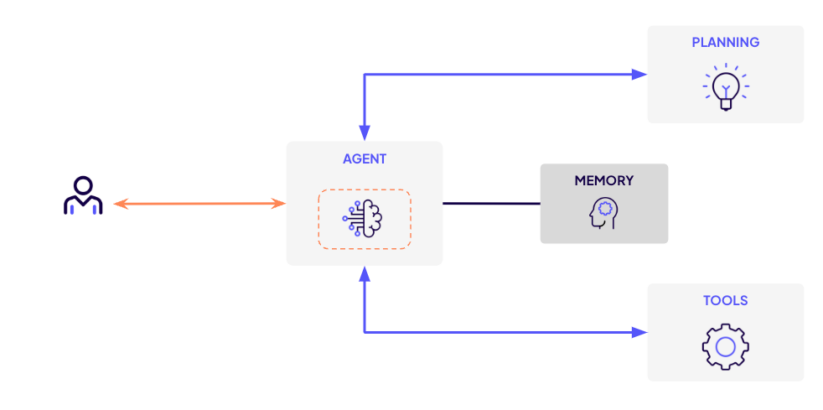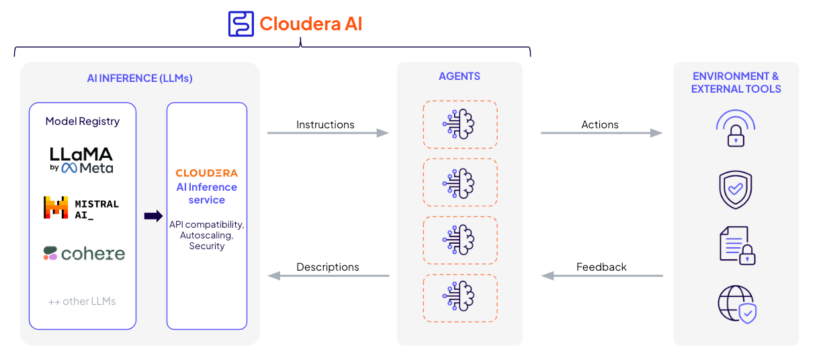Security Operations Centers (SOCs) are the backbone of organizational cybersecurity, responsible for detecting, investigating, and responding to threats in real-time. Yet, the increasing complexity and volume of cyber threats present significant challenges. SOC teams often grapple with alert fatigue, skill shortages, and time-consuming processes.
Generative AI (GenAI), coupled with Agentic AI, offers a revolutionary approach to addressing these pain points. By automating repetitive tasks, enabling proactive threat mitigation, and providing actionable insights, artificial intelligence (AI) is reshaping the future of SOCs. In this blog, we explore how Agentic AI, powered by Cloudera, enhances SOC effectiveness and ensures secure, efficient operations.
Challenges in Security Operations Centers
According to a Trend Micro survey, 70% of SOC analysts feel overwhelmed by alert volumes, while another report from Tines found that 64% plan to leave their roles due to stress and burnout. Additionally, 72% of organizations express concerns about safeguarding sensitive data, highlighting the critical need for privately hosted AI-driven solutions to address these challenges.
Overwhelmed analysts: SOC analysts contend with thousands of daily alerts from disparate sources. The relentless volume leads to alert fatigue, impacting their ability to prioritize and respond to genuine threats effectively.
Shortage of skilled analysts: The cybersecurity talent shortage is a persistent challenge. The demand for skilled SOC professionals far exceeds supply, making it difficult for organizations to scale their teams and maintain strong defenses.
Time-consuming documentation: Incident response requires detailed documentation, including reports, audits, and stakeholder summaries. These manual processes divert analysts from their primary investigative tasks.
Sensitivity of network data: Handling sensitive network data while integrating advanced AI technologies requires robust security measures to prevent data breaches and ensure compliance.
What are AI Agents?
AI agents are autonomous software systems designed to interact with their environments, gather data, and leverage that information to autonomously perform tasks aimed at achieving predefined objectives. They are a central concept in the field of AI and are designed to operate with a degree of autonomy, mimicking intelligent human behavior in decision-making, problem-solving, and learning. While humans define the goals, the AI agent independently determines the most effective actions required to accomplish them.

Image: AI Agent Components
Enhancing Security Operations with Agentic AI
GenAI offers a promising solution to these challenges. By deploying privately hosted GenAI foundational models tailored to enterprise needs, and incorporating the capabilities of Agentic AI, organizations can enhance SOC effectiveness while maintaining data security and compliance.
In the realm of SOC, AI agents represent autonomous, adaptive systems capable of perceiving cybersecurity landscapes, contextualizing threats, and executing intelligent responses in real-time.
Proactive and Autonomous Security with AI Agents
Agentic AI builds on the capabilities of GenAI by introducing a layer of autonomy and proactivity. It enables SOC systems to:
- Actively monitor and respond to threats in real-time.
- Automate routine SOC tasks with minimal human intervention.
- Provide contextual decision-making support, reducing the cognitive load on analysts.
Integrating your Agents with Privately Hosted AI Models (LLMs)
Deploying GenAI models in secure environments ensures data confidentiality. With Cloudera AI Inference service, enterprises can host AI models on-premises or in the cloud, maintaining compliance while harnessing AI’s power.
Your AI Agents can now interact with AI Models hosted on Cloudera, and all the proprietary data resides within your organization’s VPC. Also, these agents have the ability to interact with Enter Tools and Environments for further actions and Feedback.

Image: AI Agents utilize privately hosted LLMs on the Cloudera AI Inference service
End-to-end Context with Enterprise Integration
Integrating enterprise-specific data, such as historical incidents, network topology, and response protocols, enables the AI model to generate highly relevant insights. This contextual understanding enhances the model’s accuracy and applicability to the SOC’s unique requirements.

Image: Architecture of AI Agents integrated with Cloudera AI Inference, for their interaction with private LLMs and enterprise data in use for SOC Activities
For example, in a SOC use case, an AI agent tasked with threat detection and response might continuously monitor network traffic, analyze security logs, and correlate data from multiple sources to identify potential threats. Once it detects an anomaly, the agent can assess the severity, suggest remediation actions, or even execute automated responses like isolating affected systems. If the situation requires more nuanced decision-making or is beyond its scope, the AI agent escalates the incident to human analysts with detailed contextual insights, enabling faster and more informed responses.
Key Features and Benefits of this Agentic AI Solution
Organizations that employ Agentic AI solutions will save hundreds of analyst hours per month, with automated responses addressing up to 40% of repetitive threat scenarios. This translates into more focused, high-impact work by SOC teams and a stronger overall security posture.
Summarization of incident events: GenAI can process and condense large volumes of event data, providing analysts with concise summaries of incidents. Instead of sifting through logs and alerts, analysts can quickly understand the scope and nature of an event, allowing for faster decision-making.
Proactive threat mitigation: Agentic AI leverages predictive analytics to foresee potential attack vectors and suggests mitigation strategies before a threat fully manifests. This capability helps organizations stay ahead of adversaries.
Suggested remediation: AI-powered assistants can recommend remediation steps based on the analysis of past incidents and best practices. These suggestions can include isolating affected systems, patching vulnerabilities, or updating security configurations, empowering analysts with actionable insights.
Coding assistance for analysts: GenAI can act as a coding assistant, helping analysts develop new investigation notebooks and detection algorithms. This feature streamlines the creation of custom scripts and tools, enabling SOC teams to address unique threats more effectively.
The challenges SOC teams face demand innovative, scalable solutions. GenAI and Agentic AI, powered by the Cloudera platform, transform SOC operations by enhancing efficiency, reducing workloads, and improving threat response.
With Cloudera, organizations can deploy tailored AI solutions, ensuring data security and compliance. Future-proof your SOC and stay ahead of cybersecurity challenges with Cloudera’s unified approach to data management, advanced analytics, machine learning, and AI.





